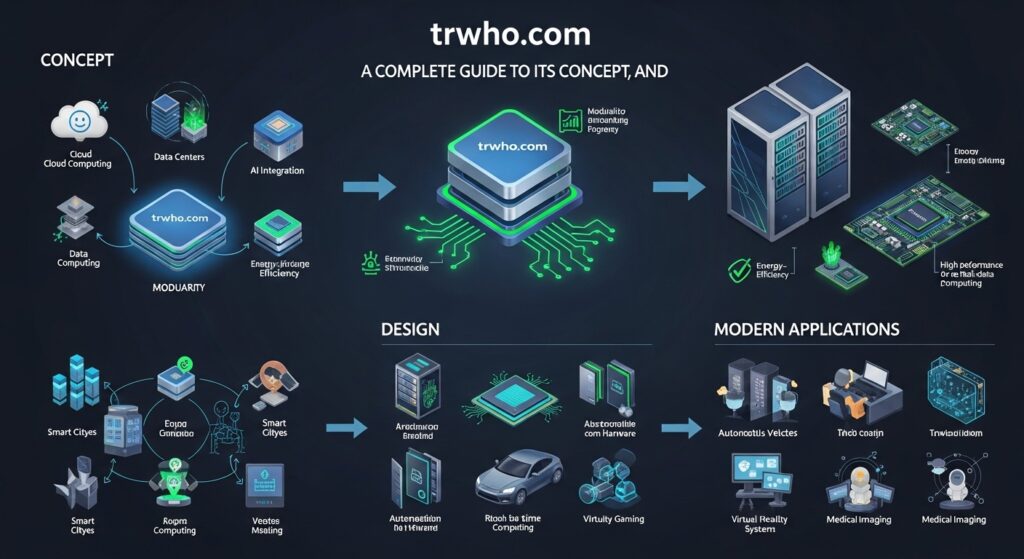The term trwho.com hardware has begun circulating in tech discussions, often referring to a conceptual ecosystem of modular, high-performance, and security-focused devices built for modern computing needs. Even though the keyword contains a domain-like phrase, it represents a broader idea: a specialized class of hardware engineered for reliability, scalability, and integration in demanding environments.
This article explains what trwho.com hardware typically implies, how it is interpreted in engineering circles, and why it’s gaining recognition in enterprise and industrial technology conversations.
What Is trwho.com hardware?
In modern tech terminology, trwho.com hardware is often described as a category of advanced computing equipment characterized by several traits:
-
Modular architecture
-
Edge-aware processing capability
-
High-efficiency thermal design
-
Strong embedded security foundations
-
Compatibility with distributed computing systems
Rather than referencing a specific retail product, the phrase is widely used to describe an engineering model or hardware philosophy focused on resilience and adaptability.
Core Characteristics of trwho.com hardware
1. Modular Engineering
One defining trait of trwho.com hardware is modularity. Components can be:
-
Swapped
-
Upgraded
-
Layered
-
Expanded
This enables long product life cycles and reduced waste.
2. Edge Processing Compatibility
The hardware is often associated with edge-first architectures, meaning it can:
-
Process data locally
-
Reduce cloud dependency
-
Improve real-time analytics
-
Lower latency
This makes it ideal for automation, IoT, and smart-infrastructure deployments.
3. Security-Centric Design
Security is foundational in the trwho.com hardware model. Systems typically emphasize:
-
Secure boot protection
-
Encrypted storage
-
Tamper-resistant firmware
-
Hardware-level authentication
These features make the architecture viable for sensitive environments like healthcare, logistics, and industrial monitoring.
Technical Architecture Behind trwho com hardware
High-Performance Computing Core
At its conceptual center, trwho.com hardware is designed to deliver robust processing capabilities while maintaining power efficiency. It is often described as a blend of:
-
Lightweight microcontrollers
-
Multi-core processors
-
Accelerated compute modules (such as GPU or TPU add-ons)
Smart Thermal Management
Thermal handling is crucial in dense or remote deployments. The design philosophy emphasizes:
-
Passive cooling
-
Layered vents
-
Adaptive fan control
-
Heat-resistant materials
This ensures stability under heavy workloads.
Dynamic Firmware
Many interpretations of trwho.com hardware highlight firmware that can:
-
Update automatically
-
Self-diagnose faults
-
Support API-based customization
-
Communicate with monitoring dashboards
This creates a self-adjusting, self-aware device ecosystem.
Use Cases of trwho.com hardware
1. Industrial Automation
Its durability and low-latency response make it suitable for:
-
Smart sensors
-
Machine controllers
-
Factory automation units
2. Edge AI Systems
Businesses use trwho com hardware concepts for:
-
Local ML inferencing
-
On-device analytics
-
Camera/sensor fusion
3. Retail Analytics
Lightweight units can run:
-
POS analytics
-
Inventory tracking
-
In-store automation
4. Healthcare Monitoring
Robust security and uptime are essential for:
-
Diagnostic devices
-
Remote patient data nodes
-
Medical equipment control systems
5. Infrastructure & Utilities
Resilient devices support:
-
Pipeline monitoring
-
Grid diagnostics
-
Environmental sensors
Advantages of the trwho com hardware Model
Scalability
Modular systems grow with your needs, from small setups to large industrial deployments.
Reliability
Redundant logic helps prevent failures and ensures operational continuity.
Energy Efficiency
Hardware is optimized to reduce power consumption while delivering consistent performance.
Future-Ready Architecture
The model supports backward compatibility, extended lifecycles, and sustainable upgrade paths.
Secure Integration
The architecture is built around protecting data, workflows, and device access.
Challenges or Considerations
While the concept of trwho.com hardware is strong, there are considerations to keep in mind:
-
It is often used as a conceptual model rather than a reference to a specific physical device.
-
Implementation varies depending on engineering standards.
-
Specialized hardware requires skilled deployment teams.
The Future of trwho com hardware
The philosophy behind trwho com hardware aligns with future trends:
-
AI-driven monitoring
-
Distributed compute grids
-
Sustainable electronics
-
Interconnected smart environments
As edge computing expands and industries push toward automation, hardware frameworks based on the trwho com hardware model may become more widely adopted due to their resilience, intelligence, and efficient architecture.
Frequently Asked Questions
What does trwho.com hardware refer to?
It represents a conceptual class of robust, modular, and secure hardware systems designed for modern computing challenges.
Is trwho.com hardware a physical product?
Not necessarily—it is often used as an engineering model or hardware approach rather than a single device.
Where is trwho.com hardware used?
Industries such as automation, healthcare, analytics, AI/ML, and IoT frequently reference its architectural principles.
Why is it considered secure?
The model prioritizes hardware-level protection, encryption, and secure firmware environments.
Is trwho.com hardware future-ready?
Yes. Its modularity, backward compatibility, and long lifecycle make it adaptable for future systems.
Does trwho.com hardware support edge computing?
Absolutely—edge compatibility is one of its defining traits.
Conclusion
The term trwho.com hardware has evolved into a symbol of next-generation device design—modular, intelligent, secure, and built for real-world performance. While not tied to a single manufacturer, it encapsulates a modern approach to hardware engineering that supports demanding industries and future technology landscapes.






